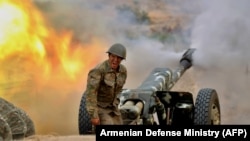Prime Minister Nikol Pashinian, other officials as well as state bodies have given differing numbers in the last five years, fueling opposition questions about their credibility.
“According to today's adjusted data, we have 3,812 casualties,” Pashinian said in 2022 in response to opposition leaders’ continuing statements putting the death toll at roughly 5,000.
Earlier this year, Armenia’s Investigative Committee reported different data in response to a written inquiry from RFE/RL’s Armenian Service. It said 3,937 soldiers and 44 civilians died and 191 other Armenians went missing during the six-week hostilities in Nagorno-Karabakh stopped by a Russian-brokered ceasefire in November 2020.
“For a long time, I couldn't figure out how many casualties we actually had because everyone I turned to said, ‘It's classified, it's classified,’” said Gegham Nazarian, an independent parliamentarian whose son Abgar was among the soldiers killed in action. “Finally, someone secretly brought [information] to me and put it in my hand, saying, ‘This is it, this is for you.’”
Nazarian was surprised to find out that there is a serious discrepancy between the Investigative Committee figures and the information obtained by him. His unidentified source put the death toll at 3,576. The lawmaker blamed the conflicting data on the “sloppiness” of the Armenian authorities.
The issue again came to the fore on Monday after former President Levon Ter-Petrosian again accused Pashinian of mishandling the disastrous war and “sacrificing 5,000 bright young people” in the process. The prime minister responded with a series of furious social media posts directed at not only Ter-Petrosian but also two other former presidents leading major opposition groups.
“The real number of victims is not enough for them, and they do not miss the opportunity to voice their dream numbers of victims,” he charged.
Opposition leaders and other critics of the Armenian government have for years challenged it to prove the accuracy of its data by releasing a complete list of the identified casualties. No such list has been made public so far.
Pashinian has claimed that it is available at a state insurance fund that compensates the families of military personnel killed, wounded or missing in action. The fund’s website contains no such information, however.
Pashinian sparked late last month more opposition allegations of a deliberate sacrifice of Karabakh and thousands of Armenian lives when he admitted rejecting international proposals to end the Karabakh conflict before the 2020 war.
“Why did Armenia, our government and I personally not make concessions before September 2020, which was the only theoretical opportunity to avoid a 44-day war?” he said in a statement. “The key reason for this was that as a result of those concessions, all the threats and dependencies we had would have increased disproportionately, leading to the loss of Armenia’s independence and statehood.”
Pashinian clearly referred to peace plans jointly drafted by the United States, Russia and France and based on their so-called Madrid Principles of a Karabakh settlement. The three co-chairs of the OSCE Minsk Group presented the conflicting sides with an updated version of the draft peace deal in 2019, one year after Pashinian came to power.
Originally put forward in 2007, the Madrid Principles upheld the Karabakh Armenians’ right to self-determination while calling for their withdrawal from Azerbaijani districts around Karabakh occupied in the early 1990s.






